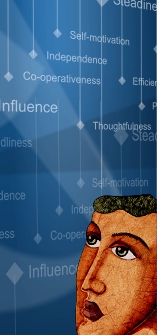|
If you're already familiar with profiling, and want to learn what DISC and Discus can do that your current system can't, you might find our Profiler's Guide to Discus more helpful.
Personality profiling, also called behavioural profiling or personality testing, is a field that covers a vast range of tools and solutions: everything from technical and clinical tools to business-oriented solutions. Some of these use hundreds of questions to measure dozens of variables, others simply identify a person as belonging to a certain category. However they work, though, all these approaches offer the same underlying solution: they identify features of a personality in a way that's intended to be useful in understanding and predicting their behaviour. 
What Does a Profiler Measure?'Personality' is a word whose meaning can be hard to pin down. In common use, for instance, most people would consider factors like intelligence or mathematical aptitude to be part of an individual's personality, but factors like those lie outside the role of a personality profile in the sense we mean it here. Instead, we're concerned with modelling the ways a person tends to behave, and the underlying traits that describe those patterns. Examples of the kinds of things we might measure would be assertiveness, self-control, decisiveness, caution, and so on. That's a part of the reason we often prefer to talk about 'behavioural' rather than 'personality' profiling, to make the distinction clear. The Advantages of ProfilingIt's not hard to imagine the kinds of advantages this sort of profiling can bring. If we have an idea of the kind of motivations and drives that lie under a person's approach to their work, it's possible to:
These aren't just theoretical benefits: they can be realized in practice but a sufficiently powerful model - and even automated in some cases. For example, see this factfile for details about how the Discus tool can handle the selection process. Profiling in PracticeThere are plenty of general advantages to profiling of this kind, but what specific uses can it be put to? Well, take a look at this list for a selection (you can click on any of the items shown here for more information on the topic in question).
Different Types of Profiling
There are various different approaches to profiling, and different models used to describe the ways a person works. Axiom's Discus profiler uses the DISC model to describe behaviour and personality in a way that's specifically designed for business use. Here's how it compares with some of the other approaches:
You can find out much more about DISC theory and practice in our extensive DISC Reference Library. If you want to see how DISC is put into practice, take a look at our Discus integrated profiler. |

Features
Reports
Branding
Software
Pricing
Training
Languages
Individual Reports
Agency Opportunities
DISC: A Layman's Guide
What is DISC?
Video: Introduction to DISC
DISC Profile Interpretations
DISC Factors
Team Building with DISC
History and Development of DISC
Personality Types
Applications: Putting DISC to Work
Validity and Reliability of DISC
Knowledge Base
(214) 613-3983
E-mail us
Skype us
Contact Details
(214) 613-3983
Features
Reports
Branding
Software
Pricing
Training
Languages
Individual Reports
Agency Opportunities
DISC: A Layman's Guide
What is DISC?
Video: Introduction to DISC
DISC Profile Interpretations
DISC Factors
Team Building with DISC
History and Development of DISC
Personality Types
Applications: Putting DISC to Work
Validity and Reliability of DISC
Knowledge Base
(214) 613-3983
E-mail us
Skype us
Contact Details
Personality Profiling: An Introduction
Choose which of our great value business packages is best for you, and you'll be up and running in just a few minutes.
| Send me an Information Pack | I would like to profile myself |
Arrange a callback
| Contact name | |
| Your contact number | |
| Your e-mail address | |
| Choose a day or days that suit you best |
Monday
Tuesday Wednesday Thursday Friday
Saturday
Sunday |
| Choose a time or period to suit you (your local time) |
About AxiomGuides |
Axiom Products |
About DISC |
Personal Profiles |
Support |

